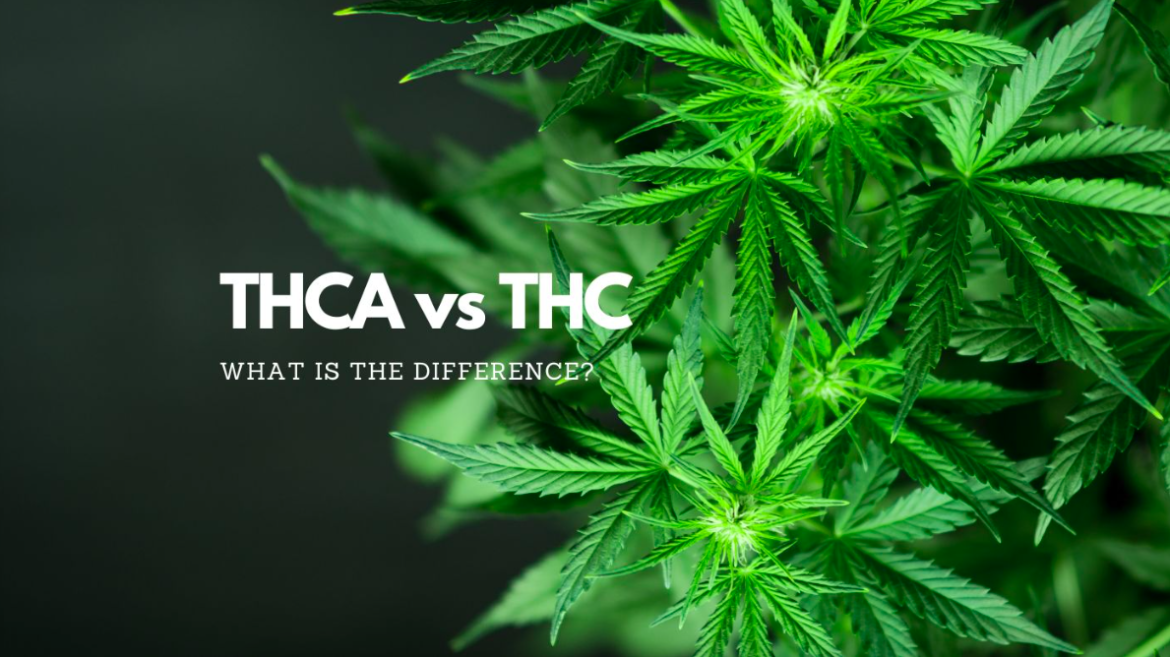Cannabis is more than just a plant—it’s a treasure trove of chemical compounds, each with its unique effects and benefits. Among these, THC is probably the most famous, but there’s another similar-sounding compound that’s just as important: THCa. You’ve likely heard these terms thrown around, especially if you’re exploring the world of cannabis. But what exactly are THCa vs. THC? How do they differ? And why should you care? Let’s dive into the fascinating world of cannabinoids to uncover the key differences and why they matter to you.
Understanding Cannabinoids
Before we get into the nitty-gritty of THCa and THC, let’s start with the basics. Cannabinoids are naturally occurring compounds found in cannabis plants. They interact with the endocannabinoid system (ECS) in our bodies, influencing everything from mood and appetite to pain and memory. While there are over 100 different cannabinoids, THC (tetrahydrocannabinol) and CBD (cannabidiol) are the most well-known. However, THCa (tetrahydrocannabinolic acid) is also a key player, especially in the raw cannabis plant.
What Is THCa?
So, what exactly is THCa? In the simplest terms, THCa is the precursor to THC. It’s found in raw and live cannabis plants before they’ve been heated or aged. THCa is a non-psychoactive compound, meaning it won’t get you high. This might come as a surprise since THC is known for its psychoactive effects, but the magic (or transformation) happens when THCa is exposed to heat.
The Role of Decarboxylation
Ever wondered why you need to heat cannabis to feel its effects? The answer lies in a process called decarboxylation. When cannabis is heated—whether through smoking, vaping, or cooking—THCa loses a carboxyl group and transforms into THC. This process is essential because, without it, you wouldn’t experience the psychoactive effects that THC is famous for.
Think of THCa as the raw, unrefined version of THC. It’s like the difference between raw dough and a freshly baked cookie. The potential is there, but it needs that extra step—heat—to unlock its full capabilities.
What Is THC?
Now, let’s talk about the big player: THC. THC is the most well-known cannabinoid and the primary psychoactive compound in cannabis. When people talk about getting “high,” they’re usually referring to the effects of THC. It interacts with the CB1 receptors in the brain, producing euphoria, relaxation, altered senses, and sometimes increased appetite (hello, munchies!). But THC isn’t just about getting high; it has a host of potential therapeutic benefits, including pain relief, nausea reduction, and appetite stimulation.
Key Differences Between THCa and THC
So, now that we know what THCa and THC are, let’s break down the key differences between the two. Understanding these differences is crucial, especially if you’re using cannabis for specific health reasons or if you’re just curious about the science behind it all.
Psychoactivity
One of the most significant differences between THCa and THC is psychoactivity. THCa is non-psychoactive, meaning it won’t alter your state of mind or give you that characteristic “high.” In contrast, THC is very much psychoactive and is the compound responsible for the mind-altering effects of cannabis.
Raw vs. Heated Cannabis
Another major difference lies in how they are consumed. THCa is abundant in raw cannabis. If you were to juice raw cannabis leaves or use the plant in its natural form, you’d be getting a dose of THCa, not THC. On the other hand, THC is found in cannabis that has been heated or aged. So, smoking, vaping, or baking your cannabis converts THCa into THC, changing the experience entirely.
Potential Health Benefits
While THC is famous for its recreational use, both THCa and THC have potential therapeutic benefits. THCa is being studied for its anti-inflammatory properties, neuroprotective effects, and potential in managing conditions like arthritis and epilepsy. THC, on the other hand, is already widely used in medical settings for pain relief, appetite stimulation, and nausea reduction, especially in patients undergoing chemotherapy.
The Therapeutic Potential of THCa
You might be wondering, if THCa doesn’t get you high, why bother with it? Well, the therapeutic potential of THCa is vast and still being explored. While THC has been extensively studied, THCa is relatively new to the research scene, but early findings are promising.
Anti-Inflammatory Properties
Inflammation is at the root of many chronic conditions, from arthritis to Crohn’s disease. THCa has shown potential as a powerful anti-inflammatory agent. It works by inhibiting the production of certain enzymes that contribute to inflammation, making it a natural alternative for managing inflammatory conditions.
Neuroprotective Effects
THCa is also being studied for its neuroprotective effects, which could make it a valuable tool in treating neurodegenerative diseases like Alzheimer’s and Parkinson’s. The idea is that THCa can help protect brain cells from damage, slowing the progression of these debilitating conditions.
Anti-Nausea and Appetite Stimulation
While THC is known for its ability to stimulate appetite and reduce nausea, THCa might offer similar benefits without the psychoactive effects. This could be particularly useful for patients who need these benefits but don’t want to experience the high associated with THC.
How to Consume THCa
If you’re interested in the potential benefits of THCa, you might be wondering how to consume it. Since THCa is found in raw cannabis, you’ll need to consume it without heating the plant. Here are a few popular methods:
Juicing Raw Cannabis
One of the most common ways to consume THCa is by juicing raw cannabis leaves and flowers. This method preserves the THCa and other beneficial compounds in their natural state. Juicing is a great way to incorporate cannabis into your daily routine without the psychoactive effects of THC.
THCa Tinctures and Capsules
If juicing isn’t your thing, you can also find THCa in tincture or capsule form. These products are made from raw cannabis and are designed to provide the benefits of THCa without the need for smoking or vaping. They’re discreet, easy to dose, and a convenient way to incorporate THCa into your wellness routine.
Raw Cannabis Edibles
While most edibles contain THC, you can find or make edibles that contain THCa. These products are made using raw cannabis that hasn’t been heated, so they retain their THCa content. Keep in mind that these edibles won’t produce the high associated with traditional cannabis edibles, making them a great option for those seeking the benefits of cannabis without the psychoactive effects.
THCa vs. THC: Which One Is Right for You?
Deciding between THCa and THC depends on your needs and goals. If you’re looking for the psychoactive effects of cannabis, THC is the way to go. It’s the compound responsible for the high that many users seek, and it also offers a range of therapeutic benefits.
On the other hand, if you’re interested in the potential health benefits of cannabis without the high, THCa might be more up your alley. Its non-psychoactive nature makes it suitable for those who want to experience the therapeutic effects of cannabis without altering their state of mind. This is particularly useful for patients who need to manage chronic conditions but still need to go about their daily activities without impairment.
The Future of THCa and THC Research
The cannabis industry is evolving rapidly, and research into cannabinoids like THCa and THC is at the forefront of this growth. As laws surrounding cannabis continue to change and more studies are conducted, we’re likely to learn even more about the unique benefits of these compounds.
The Expanding Market for THCa Products
As interest in THCa grows, so does the market for THCa-rich products. From tinctures and capsules to raw cannabis edibles, there’s a growing demand for ways to consume THCa. This is particularly true in the wellness industry, where THCa is being explored as a natural alternative for managing various health conditions.
Ongoing Research and Potential Discoveries
While we already know a fair amount about THC, the research on THCa is still in its early stages. However, the potential is enormous. As scientists continue to study THCa, we may discover even more ways this cannabinoid can benefit our health. Whether it’s through its anti-inflammatory properties, neuroprotective effects, or other yet-to-be-discovered benefits, THCa could play a significant role in the future of cannabis-based therapies.
Conclusion
In the world of cannabis, THCa vs. THC are two sides of the same coin. While they share a close chemical relationship, their effects and benefits can be quite different. THC is well-known for its psychoactive effects and therapeutic potential, making it a popular choice for both recreational and medicinal users. On the other hand, THCa offers a non-psychoactive alternative with its own set of potential health benefits, particularly for those seeking relief from inflammation, neurodegenerative conditions, and more.
Whether you’re new to cannabis or a seasoned user, understanding the differences between THCa vs. THC can help you make informed decisions about which cannabinoid is right for you.



